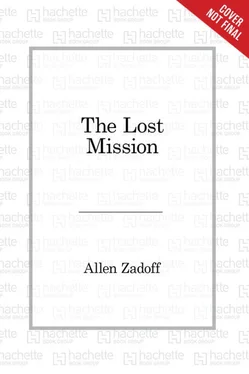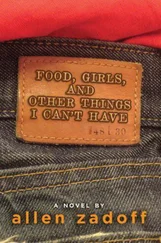Allen Zadoff
THE LOST MISSION
I STAND ON THE ROCKS HIGH ABOVE A LAKE.
The water below me is inky green, waves lapping gently against the banks of a shade-dappled cove. It’s a warm summer’s evening, but I know the water will be cool here under these trees.
Cool and deep.
We’re not supposed to be here at all, much less climb the rocks and high dive from the top. The camp counselors think it’s dangerous, and they’re right. If you angle it wrong, hit the shallow part, slip and tumble, and smack the rocks, you could hurt yourself.
Or worse. You could break your neck. That’s why this place is strictly off-limits.
Not that I care.
It is the evening of the third day since I’ve come here—a summer sports camp for boys located in southern Vermont near the New Hampshire border. I am here as a CIT, a counselor in training. There are campers and counselors who have met me, but they do not know who I am. My real identity.
They do not know there is a soldier among them.
I look down at the water below me.
It’s dangerous to jump from up here. That’s what they say. Most kids are afraid to do it.
Not me.
I jump.
There’s a thrilling sensation as I leap into space, open air around me, and then I am falling, falling, my speed increasing as I plunge headfirst into the lake. My angle is perfect and it sends me down through the water like a bullet. I kick to increase the depth of my dive, and the black bottom rushes up fast. For a second it looks like I misjudged, kicked too hard, and I’m going to smash into the lake floor and snap my neck. I stretch my arms out in front of me, brace for the sickening crunch of bone against rock.
It doesn’t come.
The water resistance slows me down just in time for my fingertips to lightly touch the bottom.
I settle on the bottom. I pick up two heavy stones and hold them in my hands, using them to weigh me down.
I stay where it is quiet and dark, where no people or thoughts can disturb me. My last mission was only a week ago, but it seems far away now.
The girl seems far away. I can’t see her face in the darkness.
I’m grateful for this.
My lungs are burning, the oxygen depleted in my system. I let them burn. The pain feels good. It feels familiar.
I am trained to deal with pain, to absorb its intensity, spreading it across my body until it disperses through the entire neural network.
Physical pain is easy. It’s the other kind that’s new to me. The emotional kind.
My body is screaming for oxygen, but I deny it, staying down an additional two minutes.
Pain control. It’s good practice.
When I’m done, I push off the bottom and hard kick my way to the surface. That’s when I see him. A boy standing on the riverbank, watching me.
How did I miss this? Even underwater, I should be able to detect this level of attention directed toward me.
The boy says, “You were down there so long, I thought you were dead.”
“You wish.”
He smiles and so do I.
This boy’s name is Peter. He is a CIT in the bunk next to mine. I met him three days ago, and he has become my friend. An instant and easy friend.
I am expert at making friends. It’s what I’ve been taught to do.
Or at least pretend to do.
“I saw you jump from the cliff,” Peter says, astonishment on his face.
“That’s hardly a cliff,” I say.
I climb out of the lake, shake water from my hair.
“It looks like a cliff to me,” he says, looking up at the rocks. “A scary friggin’ cliff.”
“Everything is scary to you. You play soccer with a mouth guard.”
“I like my teeth. You can’t fault for me that.”
“I like my teeth, too. But I’m not afraid to lose a couple for the cause.”
“What cause? The stupid soccer league?”
“Guess you’re not much of a team player, huh?”
Peter laughs. The bell from the dining hall rings in the distance.
“Is it dinnertime already?” I say.
“That’s why I came to find you. That’s the second bell.”
Two bells. We only get three. Then we miss dinner for being late. They’re trying to force some discipline onto the campers, and as CITs, we’re supposed to set a positive example.
“Let’s get going,” I say. “I’m starved.”
I pick up my T-shirt from the bank where I left it earlier. I slip it on as we head to camp.
Peter turns his back to me, exposing himself to danger without knowing it. An attack from the blind spot is always the most effective. Before Peter realized what was happening, it would be too late.
“What are they serving tonight?” I say.
Peter looks back at me. I keep an appropriate distance, four feet. Nothing that will cause him to be alarmed.
“It’s Fish Thursday,” he says. “That means excessive stink factor.”
I grin at him.
“You never laugh,” he says.
“I laugh.”
“You smile. You don’t laugh.”
“What’s it to you?”
“Nothing. I’m just saying.”
This is why I limit my connection with people. They start to pay attention and ask questions. I look at Peter, the flop of brown hair that falls onto his forehead every time he moves his head. He is not a danger to me now. He’s just talking.
“You seem serious today,” he says. “Something bothering you?”
My thoughts drift to my last mission, a girl’s eyes looking up at me in a silent plea for mercy.
“Have you ever done anything you regret?” I say. The words slip out before I realize what I’m saying.
“That’s some question,” Peter says.
Peter is sixteen like me. But he is a normal kid from the suburbs, a kid in eleventh grade, a kid who thinks he knows what’s going on in the world but who has seen nothing.
I’m sixteen, but I’ve already lived two lives. I’ve seen people die. I’ve done the killing myself.
“Forget I asked,” I say.
He doesn’t speak, just walks with me through the forest that leads back to camp.
“My brother,” he says. “That’s what I regret.”
“I didn’t know you had a brother.”
“He doesn’t talk to me anymore.”
“You had a fight?”
“He was using drugs a couple years ago and I found out and told my parents. Now he’s at boarding school on the other side of the country, and I’m the asshole brother who betrayed him.”
“If he was using, you might have saved his life.”
“Yeah, maybe. Or maybe it was just a phase, and I ruined his life. Hard to know.”
“You did the right thing.”
“That’s what the counselor at school told me. But I don’t know. If I was loyal, maybe I would have kept my mouth shut.”
I look at Peter. I detect no lies, no subterfuge. He’s not trying to trick me or make me like him. He’s just telling a story, as friends do.
“What about you?” Peter says. “What do you regret?”
I asked the question, but I can’t answer it. I’m forbidden to give details about missions past or present.
I live a secret life. Nobody knows the things I do or why I do them.
“A girl.” That’s all I can say to him.
“A hot girl?” he says.
I smile. “Very hot.”
“Did you two sleep together?”
“I don’t want to talk about it.”
Peter is arm’s length away, inside the kill zone.
“I just wonder what you regret about her,” he says.
The dinner bell rings for the third time.
“Everything,” I say.
Читать дальше













